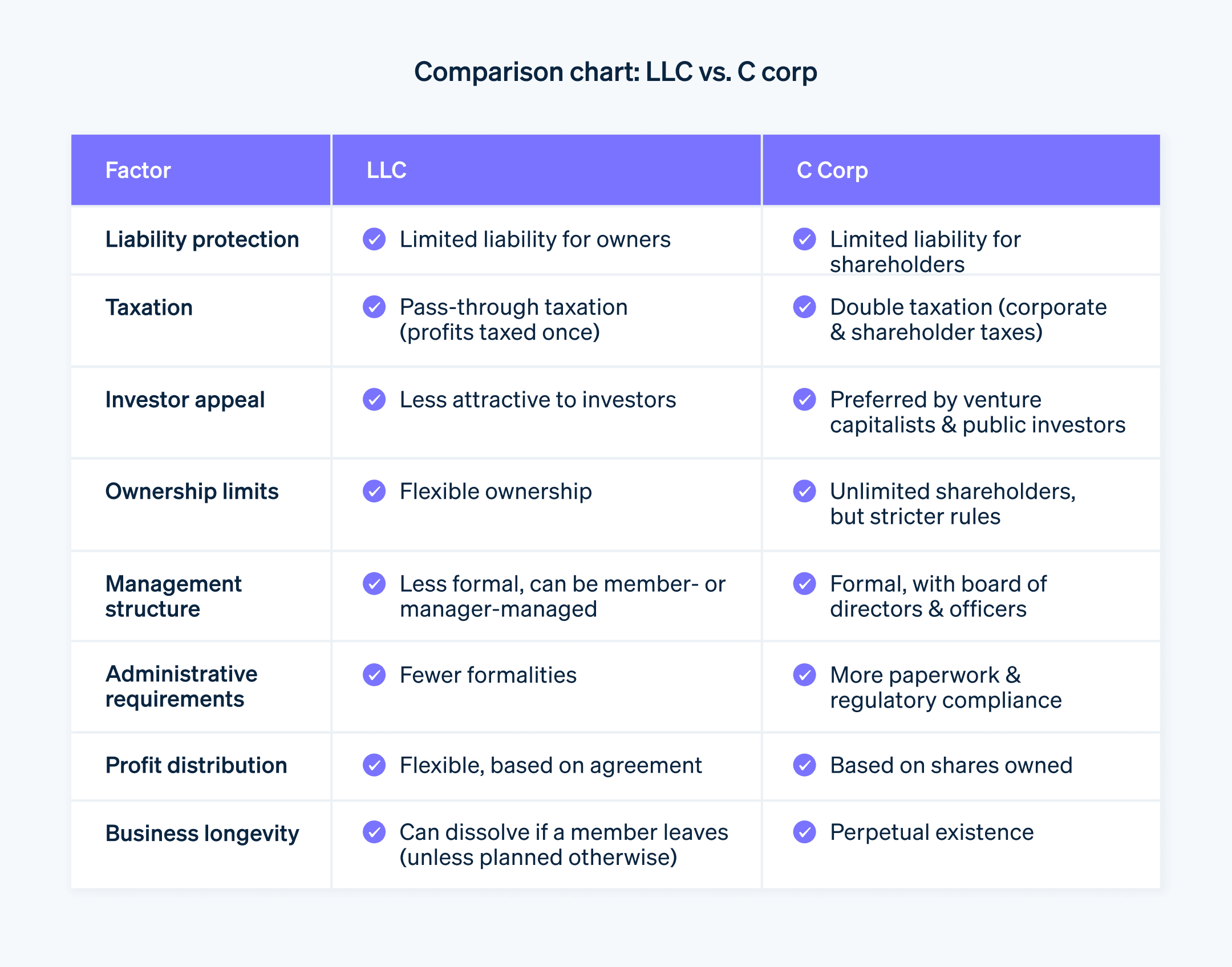据美国小型企业管理局称,截至 2022 年,美国共有 3220 万家小型企业。其中每个企业都需要选择一种企业结构,为如何运营、发展和应对挑战奠定基础。这一决定会影响企业运营的方方面面,包括责任、税收和融资能力。公司可以考虑有限责任公司 (LLC) 和 C 类公司 (C corp) 这两种企业结构类型。
决定成立有限责任公司还是 C 类公司是一项战略性选择,会对企业的运营效率、财务状况和发展潜力产生重大影响。以下是企业需要了解的有关这两种企业实体的信息。
目录
- 什么是 C 类公司?
- 什么是有限责任公司?
- C 类公司有哪些好处?
- 有限责任公司有哪些好处?
- C 类公司与有限责任公司 (LLC):异同
- 如何在有限责任公司和 C 类公司之间做出选择
什么是 C 类公司?
C 类公司,通常称为 C corp,是一种在法律上与其所有者分离的企业实体。这意味着公司本身(而不是拥有公司的股东)要对企业的行为和债务承担法律责任。C 类公司是几种企业实体之一,其中还包括 S 类公司、有限责任公司和合伙企业。
什么是有限责任公司?
有限责任公司 (LLC)是美国的一种企业结构,公司所有者对公司的债务和行为承担有限的个人责任。“有限责任”结构旨在当企业所有者(也称为成员)在企业发生法律或财务债务时保护个人资产。
C 类公司有什么好处?
C 类公司因其稳健的结构、投资潜力和永久性而备受认可,可能非常适合具有成长轨迹和未来愿望的企业。以下是 C 型企业的主要优势概述:
有限责任
C 类公司最重要的优势之一是为其所有者(股东)提供有限责任保护。这意味着,如果公司出现债务或被起诉,股东的个人资产(如房屋、汽车和储蓄账户)通常不会被债权人或诉讼人触及。这对任何创业者来说都是一个重要的考虑因素,因为它提供了额外的财务和法律保护。永久存在
C 类公司具有独立于其所有者的法律身份。这意味着它可以“永久存在”,无论其股东、董事或高管发生了什么,都可以继续生存下去。这一功能使企业能够在所有权变更和管理层过渡时保持运营的连续性,这对长期战略规划和传统的建立非常有价值。提高可信度
成立公司可以提高企业在潜在客户、供应商和投资者心目中的信誉。这种可信度来自于人们对公司稳定性和长期性的看法。正式的企业结构传递出企业专业和长期承诺的信息。更容易获得资本
C 类公司具有通过出售股票(无论是私募还是公开发行)筹集资金的独特能力。与独资企业或合伙企业等其他企业结构相比,这种结构更容易获得资本。获得更多资金意味着有更多机会增长和扩张。此外,企业还可以利用债券和可转换票据等其他各种融资方案。股东人数不限
与其他一些类型的公司不同,C 类公司的股东人数不限。这一特点对计划发展壮大的企业非常有利,尤其是打算上市的企业。这种无限股东政策使 C 类公司能够向国内外更广泛的投资者出售股份。所有权和管理权分离
在 C 类公司中,所有者(股东)和管理层可以分离。股东拥有公司的所有权,但由股东选举产生的董事会负责做出重大企业决策,并监督公司的一般事务。然后,董事会任命管理日常业务运营的高级管理人员。应税所得减免
C 类公司可以从企业所得中扣除员工福利,如医疗保险和退休计划缴款。
有限责任公司有哪些优势?
有限责任公司是一种灵活的企业结构,将保护性和简便性完美地结合在一起。有限责任公司的好处如下:
有限责任
与股份公司一样,有限责任公司为其所有者(成员)提供有限责任保护。这意味着成员个人不对公司的债务和负债负责。如果有限责任公司发生债务或被起诉,通常只有企业资产面临风险。成员的个人资产,如房屋、汽车和个人银行账户都受到保护。这一特点为成员提供了重要的保护。转嫁税
有限责任公司最吸引人的特点之一是可以通过税收获益。有限责任公司通常不在企业层面纳税。收入或亏损在所有者的个人所得税申报表中进行申报,任何应缴税款均由个人支付。管理和所有权结构的灵活性
有限责任公司在管理和所有权结构方面具有相当大的灵活性。有限责任公司可以由成员管理,即所有成员都参与企业的决策过程;也可以由经理管理,即由指定的成员(甚至外部人员)管理有限责任公司。减少文书工作和形式要求
与股份公司相比,有限责任公司的年度要求和持续手续较少。从法律角度看,这可以使有限责任公司的运营更容易,成本更低。灵活的利润分配
有限责任公司可以灵活地向其成员分配利润。有限责任公司可以选择以任何方式分配利润。这样,有限责任公司就可以在必要时平衡不同成员之间的收入差距。永久存在
在许多州,如果有限责任公司的一名成员离职或死亡,有限责任公司不会自动解散。许多州允许有限责任公司设计其经营协议,以确保在一名成员离开公司时,公司仍能继续经营。
C 类公司与 LLC(有限责任公司):异同
在选择企业结构时,C 类公司和有限责任公司之间的抉择可能具有挑战性。这两种结构各有利弊。以下是更详细的比较,可帮助您了解哪种选择适合您的企业:
税收
有限责任公司和 C 类公司的主要区别之一是如何纳税。有限责任公司是一种转嫁税实体,这意味着公司本身不缴纳任何所得税。相反,收入会转给所有者,由他们在个人报税表中申报。另一方面,C 类公司要缴纳“双重税”。公司在公司层面为其收益纳税,然后股东再为其获得的股息纳税。不过,C 类公司的优势在于可以扣除员工福利成本。投资机会
如果您打算寻求风险资本家的投资,或者如果您打算将来上市,C 类公司通常是首选。这是因为 C 类公司的股东人数不受限制,投资者对其更为熟悉。有限责任公司对投资者的吸引力通常较小,因为它是一种不太标准化的企业结构。管理结构
在 C 类公司中,管理结构分为股东、董事和高级职员,这可以明确各自的角色,但也可能带来行政管理问题。相比之下,有限责任公司的结构更为灵活。它们可以由成员(所有者)管理,也可以由管理人员管理,管理人员可以是成员,也可以是外部人员。行政要求
C 类公司通常有更多的行政要求,如举行年会、记录会议记录和制定章程。这些要求可以使企业运营更加有序,但也会导致更多的文书工作。有限责任公司的管理任务通常较少,这意味着文书工作较少,法律和会计费用较低。利润分配
C 类公司根据股东持有的股份数量向股东分配利润。有限责任公司在利润分配方面有更大的灵活性:只要在有限责任公司经营协议中有规定,它们可以以自己认为合适的方式分配利润。永久存在
C 类公司具有永久存在性,这意味着无论其个人所有者或管理人员发生什么情况,公司都可以无限期地存在下去。有限责任公司的存续期可能更为复杂,各州也不尽相同。在某些州,如果成员退出有限责任公司或去世,有限责任公司就会解散,除非经营协议中有不同的规定。

如何在有限责任公司和 C 类公司之间做出选择
成立有限责任公司还是 C 类公司取决于多种因素。下面将详细介绍如何评估企业架构的各种选择:
了解您的业务目标
了解企业的长期目标。例如,如果您的企业计划包括上市或寻求风险资本家的投资,那么 C 类公司通常是更好的选择。这是因为 C 类公司可以通过出售股份方便地转让所有权,是许多投资者熟悉和信赖的结构。另一方面,如果您的主要目标是保持简单,同时保护自己免于承担个人责任,有限责任公司可能是更合适的选择。评估您的企业性质
不同的企业有不同程度的风险和责任,这可以为您的选择提供参考。如果您的企业承担较高的责任风险,那么 C 类公司结构的额外保护可能更有利。此外,还要考虑企业的规模。员工和股东众多的大型企业可能会受益于 C 类公司的结构层次。检查您的纳税情况
有限责任公司与 C 类公司的主要区别之一是如何纳税。C 类公司需缴纳双重税 - 一次是在公司层面,另一次是在向股东分红时在个人层面。然而,有限责任公司是一个转嫁税实体,因此利润税只需在所有者的个人报税表上缴纳一次。因此,如果您的纳税情况比较简单,可能会倾向于有限责任公司。不过,如果您打算将利润再投资到企业中,而不是进行分配,那么 C 类公司的双重征税可能并不是什么大问题。考虑您的投资需求
如果吸引投资者是企业战略的关键部分,成立 C 类公司可能更有意义。C 类公司允许股东人数不受限制,通常是风险投资家和其他机构投资者的首选结构,有时甚至是必需的结构。有限责任公司的结构会使引入投资者变得更加复杂。考虑管理结构
有限责任公司的管理结构更加灵活,因为它可以由成员管理,也可以由经理管理。C 类公司有明确的结构,设有董事会和高级职员。根据您的管理风格和偏好,一种结构可能比另一种结构更有吸引力。行政要求因素
C 类公司通常需要完成更多的行政任务,如召开年会和提交报告,这对小企业来说可能是个负担。另一方面,C 类公司的形式要求有助于确保遵循良好的企业惯例。寻求外部顾问
在对上述所有因素进行评估后,请咨询企业顾问或法律专家,以便为您的决策提供指导。他们可以根据您的具体情况和目标提供建议,并帮助您了解各州对成立有限责任公司或 C 类公司的具体要求和流程。

Stripe Atlas 如何提供帮助
Stripe Atlas 可为贵公司搭建法律架构,助力在两个工作日内从全球任何地点完成融资、开设银行账户及接收付款。
已有超 7.5 万家公司通过 Atlas 完成注册,其中包括获 Y Combinator、a16z 与 General Catalyst 等顶级投资机构支持的初创公司。
申请使用 Atlas 注册公司
通过 Atlas 申请注册公司仅需不到 10 分钟。您可自主选择公司架构,即时核验公司名称是否可用,并可添加最多四位联合创始人。您还需确定股权分配方案,预留一定比例的股权供未来投资者与员工认购,指定公司管理人员,并通过电子签名完成所有文件签署。所有联合创始人也将收到邮件邀请,通过电子签名签署其对应文件。
在获取雇主识别号 (EIN) 前开通收款和银行服务
完成公司注册后,Atlas 会为您申请雇主识别号码 (EIN)。持有美国社会保障号、美国地址及手机号码的创始人可享受美国国税局 (IRS) 的加急处理服务,其他创始人则需通过标准流程申请,耗时可能稍长。此外,Atlas 支持在 EIN 下发前进行收款与银行开户操作,让您在 EIN 获批前即可开始收款并完成交易。
无现金创始人股权认购
创始人可使用知识产权(如版权或专利)而非现金认购初始股份,相关认购凭证将存储在 Atlas 管理平台中。使用该功能需满足知识产权估值不超过 100 美元的条件;若您持有的知识产权价值高于此限额,请在操作前咨询专业律师。
自动提交 83(b) 税务申报
创始人可通过提交 83(b) 税务申报降低个人所得税负。无论您是美国籍或非美国籍创始人,Atlas 均可代为完成申报流程——采用 USPS 认证邮件寄送并附带物流追踪服务。您可直接在 Stripe 管理平台获取已签收的 83(b) 申报表及官方寄送凭证。
全球顶尖水准的公司法律文件
Atlas 为您提供创办公司所需的全部法律文件。Atlas 的 C 类公司文件由全球顶尖风投律所美国科律律师事务所 Cooley 联合设计,旨在助您立即启动融资,并确保公司获得全方位法律保护,涵盖股权架构、权益分配及税务合规等核心领域。
Stripe Payments 服务首年免费,更享价值 5 万美元的合作伙伴专属优惠与折扣
Atlas 与顶级合作伙伴深度联动,为创始人提供独家优惠与资源支持,涵盖 AWS、Carta、Perplexity 等行业领军企业的工程开发、税务合规、财务管理及运营必备工具折扣,更免费赠送首年特拉华州法定注册代理服务。作为 Atlas 用户,您还将解锁 Stripe 专属权益——最高 10 万美元交易额的全年免费支付处理服务。
了解关于 Atlas 如何助您快速轻松地创立新企业的更多信息,或立即开始使用。
本文中的内容仅供一般信息和教育目的,不应被解释为法律或税务建议。Stripe 不保证或担保文章中信息的准确性、完整性、充分性或时效性。您应该寻求在您的司法管辖区获得执业许可的合格律师或会计师的建议,以就您的特定情况提供建议。